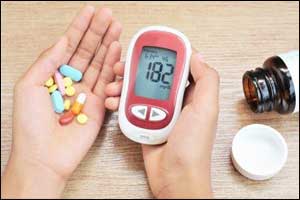- Home
- Editorial
- News
- Practice Guidelines
- Anesthesiology Guidelines
- Cancer Guidelines
- Cardiac Sciences Guidelines
- Critical Care Guidelines
- Dentistry Guidelines
- Dermatology Guidelines
- Diabetes and Endo Guidelines
- Diagnostics Guidelines
- ENT Guidelines
- Featured Practice Guidelines
- Gastroenterology Guidelines
- Geriatrics Guidelines
- Medicine Guidelines
- Nephrology Guidelines
- Neurosciences Guidelines
- Obs and Gynae Guidelines
- Ophthalmology Guidelines
- Orthopaedics Guidelines
- Paediatrics Guidelines
- Psychiatry Guidelines
- Pulmonology Guidelines
- Radiology Guidelines
- Surgery Guidelines
- Urology Guidelines
GLP-1 receptor agonist Dulaglutide cuts cardiovascular and kidney risk in diabetics, finds international study

One of the longest ever study spanning over more than five years has found benefits of a cardiovascular risk-reducing agent in the field of diabetes. The study to assess cardiovascular outcomes in patients treated with a GLP-1 receptor agonist has found that subcutaneous dulaglutide (Trulicity) is associated with a 12% decrease in cardiovascular events versus placebo in older patients with type 2 diabetes (T2D). In addition, during the same period, the drug reduced the development of kidney disease by 15%. This effect was seen in both men and women with or without previous cardiovascular disease.
The clinical trial Rewind after following more than 9,900 people in 24 countries has found that the drug dulaglutide reduced cardiovascular events and kidney problems in middle-aged and older people with Type 2 diabetes. Two papers describing the cardiovascular and kidney results of the trial were published today in the journal The Lancet from the study called the Researching Cardiovascular Events with a Weekly Incretin in Diabetes (REWIND) trial.
The trial was led by the Population Health Research Institute (PHRI) of McMaster University and Hamilton Health Sciences.
"Compared to others, people with diabetes have twice the rate of cardiovascular events like heart attacks and strokes, and up to 40% of people with diabetes develop kidney disease," said Hertzel C. Gerstein, principal investigator for the study, professor of medicine at McMaster and deputy director of the PHRI.
"The REWIND trial shows that dulaglutide can safely reduce these events while improving diabetes control and modestly lowering weight and blood pressure in middle-aged people with Type 2 diabetes."
Nearly one in five people over the age of 60 have diabetes and most have Type 2 diabetes. Altogether, nearly ten percent of adults are living with diabetes, including 425 million people worldwide; 100 million in the U.S., and three million people in Canada.
Dulaglutide is a glucagon-like peptide-1 receptor agonist that is injected once per week. It is approved for glucose lowering and works by helping the pancreas release the right amount of insulin when blood sugar levels are high, slowing the emptying of the stomach after a meal, and reducing appetite and weight.
Gerstein pointed out the trial participants were very similar to the sorts of people with diabetes who are seen in medical practice. Participants were followed for a median of 5.4 years, much longer than previous trials, and more than 46 per cent of participants were women. Less than a third of participants had previous cardiovascular disease.
The drug was well tolerated, modestly reduced weight, low-density lipoprotein (LDL) cholesterol and blood pressure, and modestly increased heart rate. Gastrointestinal side effects including constipation or diarrhea were reported more frequently in participants taking dulaglutide (47%) compared to placebo (34%).
The REWIND trial was funded by Eli Lilly and Company, the makers of the dulaglutide drug Trulicity. The study was designed and led by a team of scientists that included representatives of the funder. The data were analyzed by scientists of the PHRI and the principal investigator had final responsibility for the papers.
For further reference log on to ;
Hertzel C Gerstein, et al. Dulaglutide and cardiovascular outcomes in type 2 diabetes (REWIND): a double-blind, randomized placebo-controlled trial. The Lancet (2019) DOI: https://doi.org/10.1016/S0140-6736(19)31149-3

Disclaimer: This site is primarily intended for healthcare professionals. Any content/information on this website does not replace the advice of medical and/or health professionals and should not be construed as medical/diagnostic advice/endorsement or prescription. Use of this site is subject to our terms of use, privacy policy, advertisement policy. © 2020 Minerva Medical Treatment Pvt Ltd